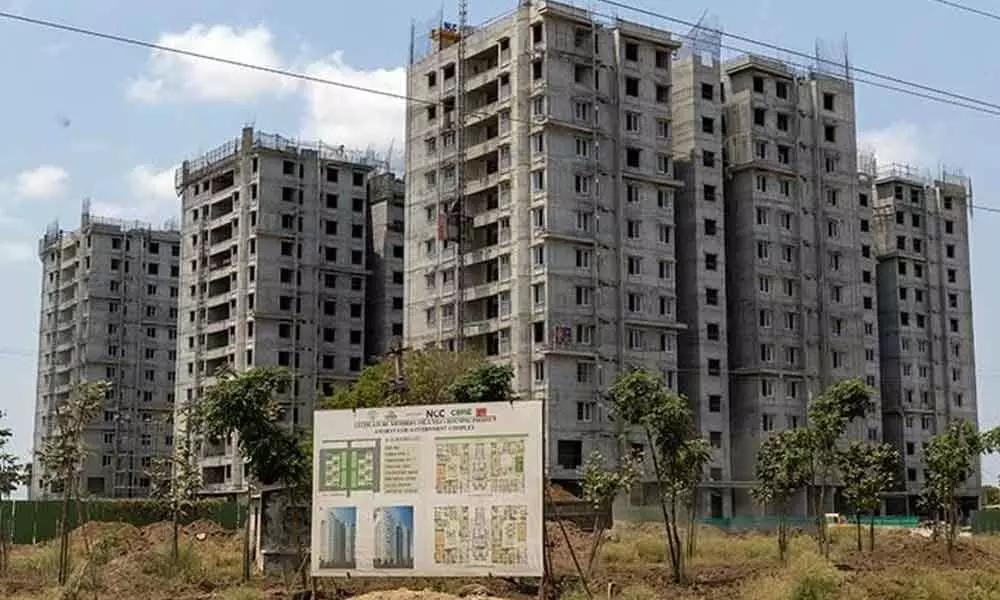Live
- BGT 2024-25: Nitish Kumar Reddy, Harshit Rana make India Test debuts in first Border-Gavaskar Trophy in Perth
- 100 students fall sick after consuming contaminated food
- TCS will commence ops in Visakha in 3 months: Lokesh
- Pawan, 2 other ministers rule out VSP privatisation
- HC Bench In Kurnool: House passes unanimous resolution
- Low Pressure Area Likely in Southeast Bay of Bengal, Heavy Rains Forecasted for AP
- Malabar Gold & Diamonds launches new gold jewellery
- Collector reviews arrangements for Guv’s visit
- 13 members of robbery gang arrested
- Country’s development depends on youth’s progress: Collector Vinod
Just In

Thousands of migrant workers are leaving the capital region of Amaravati to return to their places of origin with the construction activity coming to a grinding halt due to scarcity of sand and economic slowdown.
Vijayawada: Thousands of migrant workers are leaving the capital region of Amaravati to return to their places of origin with the construction activity coming to a grinding halt due to scarcity of sand and economic slowdown.
The migrant workers came from places like Bihar, Odisha, Rajasthan, Uttar Pradesh and West Bengal. About 50,000 skilled and unskilled workers from various north Indian States used to work in the capital region and contributed to the development of region, particularly the construction of several hundred big and small apartments, villas, individual houses, shopping complex and multiplexes.
However, the scenario has changed for the past few months for the migrant workers. Due to various factors, the investors stopped funding for the new projects and the ongoing projects are also halted due to non- availability of sand. It is the prime reason for the construction activity grinding to a halt.
It is not known exactly how many migrant workers left the capital region. But the figure is in thousands. K Venkat, a builder, said he could not sell his apartment flats because 20 per cent work is yet to be completed. He said he could not buy sand even in black market to complete the remaining work.
Thousands of workers relating to 30 types of trades depend on the construction activity for their livelihood. Masons, painters, marble workers, electricians, carpenters, plumbers, daily wage construction workers, both skilled and unskilled, are losing their income due to halting of construction activity.
Most migrant workers used to stay in small houses and rooms in the outskirts of the cities like Vijayawada, Guntur and towns of Mangalagiri and Tadepalli and save their money to help their families. They used to send between Rs 7,000 and Rs 15,000 per month to their homes. Now, they do not have income and the future looks bleak, said Mohammed Saleem, a migrant worker from Rajasthan.
The migrant workers began to return to their native place since the halting of the capital construction works and migration to their homes gradually increased in the recent weeks. Several hundred workers used to work in the storm water drain project in Vijayawada. More than 90 per cent workers are from Bihar, Odisha, Jharkhand and other places.
Almost all workers left the city because they do not find work immediately in the city due to stalling of the construction activity. In every festival season most workers go back to their places and spend three to four weeks and come back to the capital region.
Now, most workers are losing hope that the construction activity would pick up swiftly and they could get suitable work to secure employment the capital region. Most workers are not able to send money to their homes because they do not have income, said R Naveen, a builder in Bhavanipuram. Thousands of local workers and employees working in unorganised sector in the capital region too are concerned about their job security.

© 2024 Hyderabad Media House Limited/The Hans India. All rights reserved. Powered by hocalwire.com







